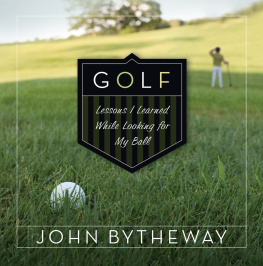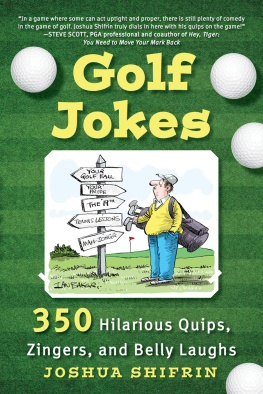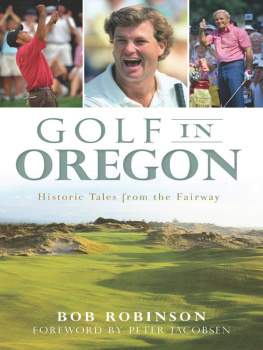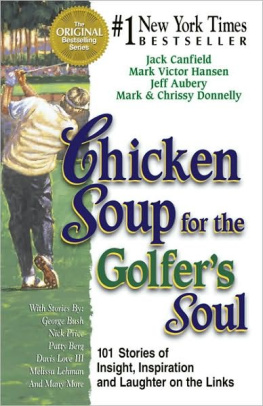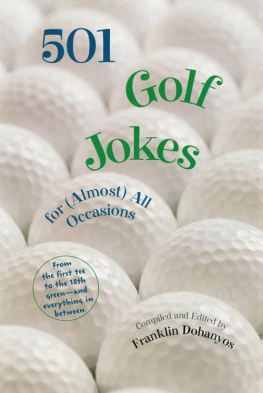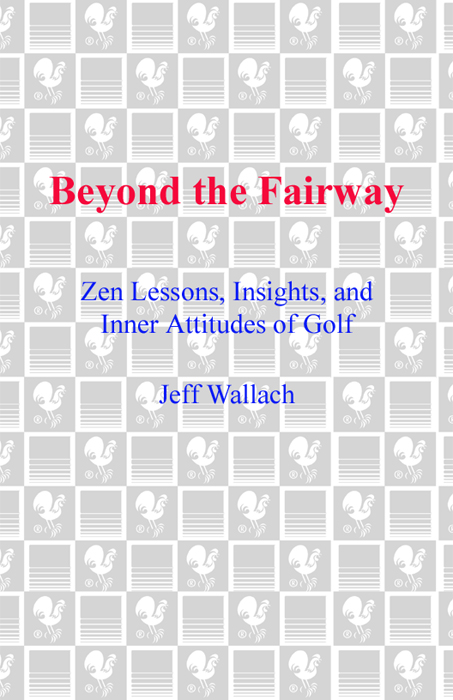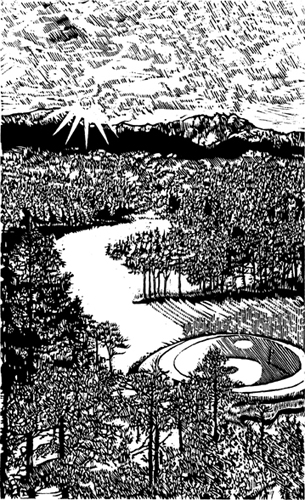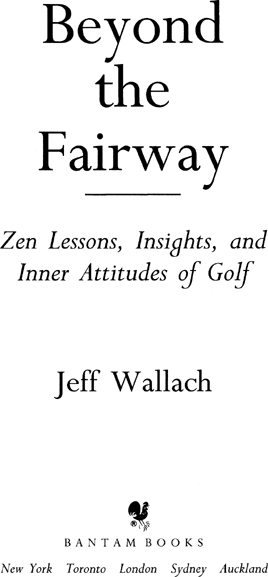Contents
PART ONE: Zen Perspectives from the Fairway:
Old Doglegs, New Tricks
1
2
3
PART TWO: On the Fringe: Transcendence and
Visualization
4
5
6
7
8
PART THREE: Into the Rough: Students, Masters, and
Other Zen Golf Individualists
9
10
11
12
13
PART FOUR: East of Beyond: Enlightenment at the
Games Unmanicured Outer Limits
14
15
16
INTRODUCTION
Beyond the Fairway
M Y FIRST GOLF MEMORY IS AS CLEAR TO ME AS MY OWN namespelled out in bold black lettersat the top of the leader board in the U.S. Open of my dreams: I was eight years old, and we were visiting my grandparents in Florida during spring vacation. On an afternoon when nothing had been planned for my brother and me and wed tired of playing shuffleboard and laughing at the old men in Bermuda shorts and white patent leather shoes with dark socks, our dad rescued us from imminent trouble by taking us out to a pitch-and-putt golf course just off Collins Avenue in Miami Beach. It was late in the day, and the tropical sky was threatening. Palm fronds danced crazily in a wind, and soon thunder and lightning would roll in off the slate-gray ocean.
The tiny golf course was ragged and weird (characteristics I would learn to love many years later), built up with brown mounds that were supposed to emulate the rolling terrain of a Scottish links in miniature, set among the high rises and strip malls of south Florida. It was the kind of place where they handed you a wedge and a putter when you paid your greens fee. We were the only people out on the course.
It must have been around the sixth hole. My brother, who was already a good athlete at age thirteen, and my dad, who had always been one, teed off. I took a few full misses at my own bruised Titleist, and then sculled a slow grounder fifty yards into a sand trap next to the green. A good shot, for me.
As we walked down the fairway, my brother shook his head disapprovingly and suggested that I just pick up, since I would never hit my ball out of the trap. I looked at my father, who glanced at the darkening sky and then handed me his own sand wedge. Try to hit two inches behind the ball, he advised with totally unfounded confidence, an unreasonable optimism that only a father could express. Perhaps if Id said that I needed to meet up with a B-movie starlet in a hotel in Los Angeles that very night, he would have handed me the keys to his Buick: My dad implicitly believed in his boys.
I nodded and smiled as I took the wedge. I walked into the middle of the trap, as the men of my family looked on and scattered raindrops fell. I drew the club back and swung it with all the awkwardness of a nonathlete. Yet I understood exactly how this shot was supposed to work. It made complete sense to me to hit behind the ball and follow through with exaggerated momentum.
Sand flew off the club face, and in that frozen moment when I looked up, I saw several things at once: my father grinning widely in approval; my brother, standing behind the green and laughing because he thought Id hit only sand; and the perfect white smiling sphere of my ball climbing, floating, ascending over the lip of the trap. It landed on the gauzy Bermuda grass and rolled to a stop three feet from the pin.
If I were a touring pro writing his memoirs, this particular anecdote might have ended with me holing out and proceeding from that experience to a career filled with great golf shots that would highlight how I over compensated for my early, uncoordinated years by excelling at the sport.
This is not a golfing memoir, which is another way of saying that Im still an eighteen handicap. But its precisely in the fact that I didnt instantly master the game (and still havent) that the real story occurs; its in the fact that a clumsy eight-year-old who wouldnt come into his own for another two decades could hit a perfect golf shot, and then spend the ensuing years trying to duplicate the experience, truly believing that he could always become something far greater than he was on any given day, somehow comprehending all along that nearly everything he really needed to know about golf was already inside him.
Although I was too young to understand it as such, I experienced a deeply transcendent moment on that scrubby golf course in Florida. There hadnt been time to think about how important it was to hit a great shot or, as I do now, to fiddle with my grip and try to remember the advice (often conflicting) of a dozen different pros whove offered me tips over the years. There wasnt room to consider how a great shot might elicit my brothers approval, please my father, and make meeven for an instant, but an instant I wouldnt soon forgeta star. The event was this pure: I understood how the shot should work, which left only the execution of it. And when youre so sure of something, to the exclusion of all other possible outcomeswhen youre not even conscious of the act or its consequencesthere can be only one result. I hit the perfect shot.
Many years later, the same kind of thing happened to me while I was playing at Poppy Hills on the California coast with an old college friend, a five handicap who, at age thirty, claimed to be training for the senior tour. Id been playing badly all day. Id already launched half a dozen balls into the graceful, innocent Monterey pines, and was embarrassed by my performance. But on the final three holes, when I was far beyond caring whether I scored well, something clicked: I strung together a series of long, straight, accurate shots, and finished with birdies to card a nearly respectable 95. The sudden purity of my swing was trying to tell me something, and I knew that if I examined this phenomenon long enough, the skies would cleave open above me and Id reach some sort of deep understandinglike Zen monks, who spend years studying koans (ancient, mystical parables) to achieve a moment of revelation. Golf, I knew, could provide insight into the truer aspects of experience. In that way, the game is like an out-of-body experience, or truly memorable sex.
When golf first became a metaphor to me, I believed that if I could only control my game, I could necessarily exert the same kind of discipline and control in other areas of my life. But, of course, I achieved that temporary perfection on the last few holes at Poppy Hills because I let go of control, of trying to impress my friendit seemed too late for thatand because I was no longer concerned with shooting a round that I could brag about later. If Id looked more closely at that early sand shot in Florida or my string of birdies at Poppy Hills, I might have recognized that the game was really trying to teach me the opposite lesson: to transcend control, to lose consciousness of everything. Only then might I playand livepurely. When I stopped caring about such specific and limited goals as my score, when I surrendered to the process and just played, I began truly to experience and enjoy each shot, and I began scoring better.


